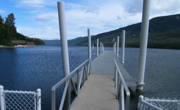Culture Change Letter #165 - In the waters around Seattle, Washington, three dozen communities are enriching their bioregion with a common vision of sustainability -- despite the pressures of corporate globalization dominating almost everyone's life. This new vision is being coupled with the resurgence of sailing, with an eye to the tempestuous horizon promising the unprecedented effects of peak oil and global heating. The roots of this developing project include local, native traditions as well as some modern daydreaming sailors hailing from as far away as California. |
|||
Culture Change Letter #153 - pre-petroleum techniques and materials. Rather than getting them from separate business sources, these techniques and materials will be better offered within the reliable network of a devoted community. In this endeavor a post-petroleum culture will be nurtured. |
|||
Culture Change Letter #151 - [Note: this article was revised in June 2008 over a year after it appeared.] - |
|||
Publisher's note: the following article is no longer valid as to the Wanderer, which cannot return to the water. - Jan Lundberg A Personal Narrative On the Legacy and Spirit of Joshua Slocum, and the Schooner Wanderer- by Cpt. P.W. Flowers, master of the Wanderer In 1892, Captain Joshua Slocum, having retired, received as a gift, or I should say, a joke from Capt. Eben Pierce, a “ship” which proved to be a very antiquated sloop in Fairhaven, CT, that the neighbours had said must have been built “in the year 1.” She was on the hard, meaning ashore, propped up on stands, miles from sea and people thought that the only thing this ship was good for was to be broken up into fire wood. Capt. Slocum felled his first oak-tree a month later and began refitting her. |
|||
[Publisher's note: The article below is strictly for our archival record as of February 2007, due to the Wanderer's unfortunate state of her hull and the removal of this project from Culture Change. The request for donations has been deleted. The announcement below of the launch of Sail Transport Network was premature at the time. Since then we have pursued other possibilities on both sides of the Pacific and in the Caribbean. In March 2009 we received corrected information on the Wanderer's builder, and edited the piece below accordingly. - Jan Lundberg, Publisher of Culture Change, March 2009]
Editor's note: We're happy to report that the long launch of the Sail Transport Network has proven successful. This article and proposal is about STN's first practical project, toward our goal of sustainable trade and transport powered by truly renewable energy. More news on STN will be forthcoming on the Culture Change website and at the San Francisco Petrocollapse Conference.
Proposal for the Refit of the Schooner Wanderer
The purpose of this proposal is to perpetuate the existence of the Schooner Wanderer, and to refit her as a freight vessel serving Central America and the United States for the Sail Transport Network.
The Wanderer is a replica of a 1903 Grand Banks Schooner, hand-built in 1985 at Trinity Bay, Newfoundland by Henry Thomas Vokey. She was originally named the J & B, after Henry Vokey's four daughters; Jane, Josephine, Bonnie and Bernice. She was Vokey's last tall ship project, his largest, and favorite. He will be 80 years old in October 2009, and he is still building sailboats.
|
|||
Editor's note: The Marion Institute held its well-attended Bioneers By The Bay conference at the University of Massachusetts - Dartmouth from October 20-22, 2006. As part of Jan Lundberg's workshop "Petrocollapse and Mitigations for the U.S. Northeast," Dimitry Orlov presented the fast-advancing concept of sail power as a practical system for offering coastal and global travel when fuel prices and supplies are prohibitive for land and air transportation.
Under sail, the volume of travel would be vastly decreased compared to today, as would trade-transport volume. But sail power can provide some minimum basis for travel, cultural exchange and trade, using renewable energy and, eventually, using all renewable materials. Here is Orlov's talk, which was accompanied by a slide show of tables, talking points and photographs, incorporated herein:
STN Hello everyone! My name is Dmitry Orlov. You may have run across some of my articles if you have visited Web sites such as CultureChange.org, FromTheWilderness.com, SurvivingPeakOil.com, or LifeAfterTheOilCrash.net. |
|||
[Editor's note: In this timely and comprehensive work, the author charts a most resonable future. Dmitry Orlov is known for writing and lecturing about the collapse of the Soviet Union as a guide to U.S. petrocollapse. World trade depends on cheap petroleum, especially bunker fuel for ships. As goods such as food have come to be transported further and further, involving also trucks, trains, barges and jets, modern societies have become dangerously dependent on a fast-dwindling, non-renewable resource. Peak oil and petrocollapse will not only end "growth" but will soon turn our artificial world of corporate global trade upside down. In its place people will look to sustainable systems, such as described below. As a matter of history at Culture Change, the Sail Transport Network was launched in 2000 - ahead of its time. Dmitry Orlov's tour de force may serve to relaunch STN, but with greater vision and expertise. - JL] |
|||

